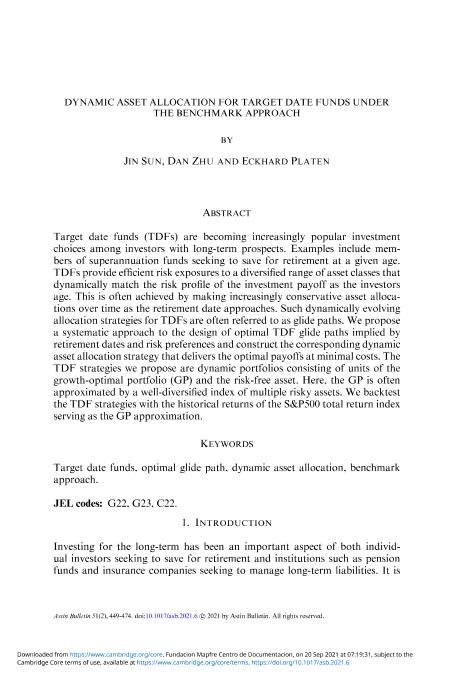Dynamic asset allocation for target date funds under the benchmark approach

Contenido multimedia no disponible por derechos de autor o por acceso restringido. Contacte con la institución para más información.
| Tag | 1 | 2 | Valor |
|---|---|---|---|
| LDR | 00000cab a2200000 4500 | ||
| 001 | MAP20210027307 | ||
| 003 | MAP | ||
| 005 | 20210920104516.0 | ||
| 008 | 210920e20210510gbr|||p |0|||b|eng d | ||
| 040 | $aMAP$bspa$dMAP | ||
| 084 | $a6 | ||
| 100 | 1 | $0MAPA20210031830$aSun, Jin | |
| 245 | 1 | 0 | $aDynamic asset allocation for target date funds under the benchmark approach$cJin Sun, Dan Zhu, Eckhard Platen |
| 520 | $aTarget date funds (TDFs) are becoming increasingly popular investment choices among investors with long-term prospects. Examples include members of superannuation funds seeking to save for retirement at a given age. TDFs provide efficient risk exposures to a diversified range of asset classes that dynamically match the risk profile of the investment payoff as the investors age. This is often achieved by making increasingly conservative asset allocations over time as the retirement date approaches. Such dynamically evolving allocation strategies for TDFs are often referred to as glide paths. We propose a systematic approach to the design of optimal TDF glide paths implied by retirement dates and risk preferences and construct the corresponding dynamic asset allocation strategy that delivers the optimal payoffs at minimal costs. The TDF strategies we propose are dynamic portfolios consisting of units of the growth-optimal portfolio (GP) and the risk-free asset. Here, the GP is often approximated by a well-diversified index of multiple risky assets. We backtest the TDF strategies with the historical returns of the S&P500 total return index serving as the GP approximation. | ||
| 650 | 4 | $0MAPA20080554927$aJubilación | |
| 650 | 4 | $0MAPA20080579258$aCálculo actuarial | |
| 650 | 4 | $0MAPA20080588953$aAnálisis de riesgos | |
| 700 | 1 | $0MAPA20160009903$aZhu, Dan | |
| 700 | 1 | $0MAPA20210031847$aPlaten, Eckhard | |
| 773 | 0 | $wMAP20077000420$tAstin bulletin$dBelgium : ASTIN and AFIR Sections of the International Actuarial Association$x0515-0361$g10/05/2021 Volumen 51 Número 2 - mayo 2021 , p. 449-474 |

